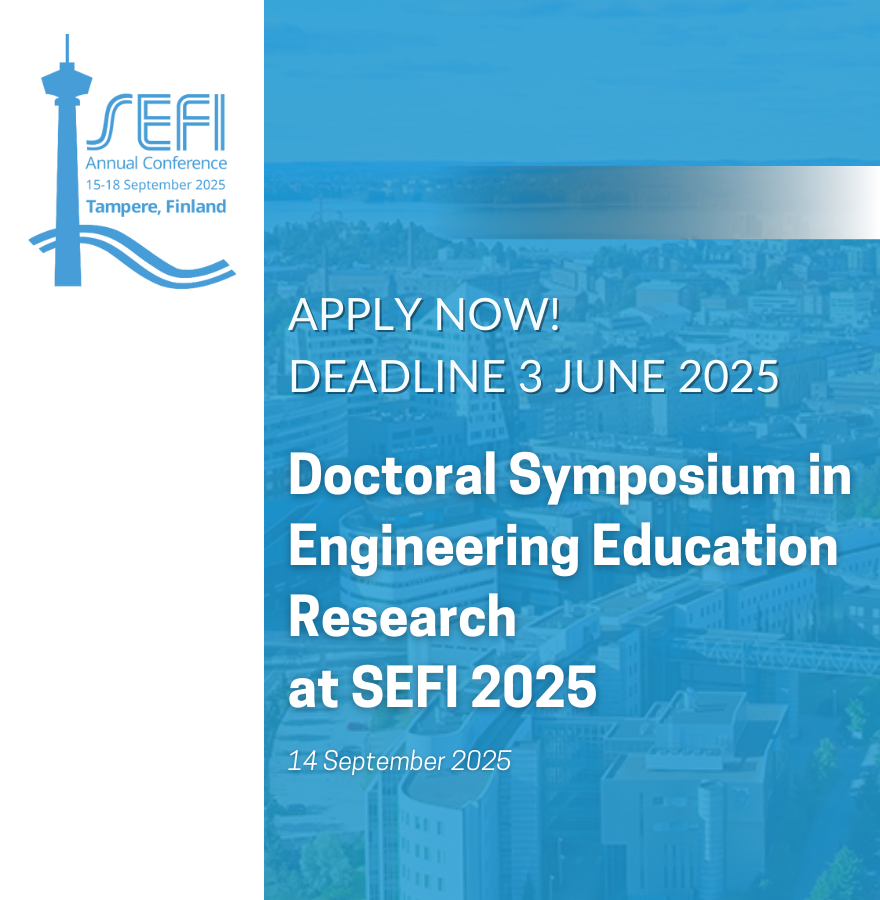The SEFI Francesco Maffioli Award of Excellence for Developing Learning and Teaching in Engineering Education…

Tuesday, 12 October 2021, 15:00 – 16:30 GMT (UK)/ 16:00 – 17:30 CEST (EU)
In spite of continuous efforts to promote engineering and technology degrees and careers to young women, it remains a male-dominated field in Europe. In OECD countries, fewer than 1 in 3 engineering graduates are female. This low participation of girls and young women in engineering and technology education is likely because of stereotypes and expectations, rather than ability and performance differences in math and physics.
In a recent study by Moote et al (2020), the association of engineering with masculinity is evident in aspirations from age 10. Godwin et al (2016) found a stronger link between women’s agency belief, rather than maths and physics identities, and engineering career choice. Many other studies have identified numerous factors that have been linked to whether young women choose and persist in STEM areas such as interest in science, self-efficacy, role models, and science capital.
For this session we invited colleagues from Brazil, Sweden and the UK to discuss and explore ways to motivate young women to pursue engineering and technology education.
Speakers
Valquíria Villas-Boas (Universidade de Caxias do Sul, Brazil) confirmed
Ulrika Sultan (Linköping University, Sweden) confirmed
Kate Bellingham (University College London, UK) confirmed
Moderators
Bill Williams (Instituto Superior Técnico, Portugal; TU Dublin, Ireland)
Inês Direito (University College London, UK)
References
Godwin, A., Potvin, G., Hazari, Z., & Lock, R. (2016). Identity, Critical Agency, and Engineering: An Affective Model for Predicting Engineering as a Career Choice. Journal of Engineering Education, 105(2), 312–340. https://doi.org/10.1002/jee.20118
Moote, J., Archer, L., DeWitt, J., & MacLeod, E. (2020). Comparing students’ engineering and science aspirations from age 10 to 16: Investigating the role of gender, ethnicity, cultural capital, and attitudinal factors. Journal of Engineering Education, 109, 34–51. https://doi.org/10.1002/jee.20302
Valquíria Villas-Boas’ conference title: Encouraging Girls in Science and Technology – 12 Years of History
This talk is related to the project “Encouraging Girls in Science and Technology” that has been underway at the University of Caxias do Sul for the last 12 years. This project aims to engage elementary and high school girls in science and engineering activities such as hands-on workshops, science and astronomy club, science and technology fairs, Mathematical Olympics, chats with scientists and engineers, and Science at the movie theater. The results already obtained show that it is possible to contribute to the insertion of more and better female elementary and high school students in the scientific and technological fields, as well as to reduce the impact of gender inequalities on the career choices of these students. In the medium to long term, this kind of project can contribute immensely to the scientific and technological development and innovation of a country like Brazil, by encouraging the participation and training of girls and women for careers in the Exact Sciences, Engineering, and Information Technology.
Short bio
I am a full professor at the Exact Sciences and Technology Center of the University of Caxias do Sul (UCS) in Brazil. I have a B.S., M.S. and PhD in Physics from the University of São Paulo. My M.S. and PhD theses treated magnetic and structural properties of hard magnetic materials. I am part of the faculty of the Master’s Program in Science and Mathematics Teaching at UCS. I teach basic physics to engineering and physics students, as well as courses in the teacher training program. I have been teaching engineering students for the last 22 years. I am a member of the Steering Committee of the Active Learning in Engineering Education (ALE), of the Consultative Committee for the Aalborg Centre for PBL in Engineering Science and Sustainability and of the Research in Engineering Education Network. I am the coordinator of the Active Learning in Engineering Education group of the Brazilian Association of Engineering Education. And, for 11 years, I was the proud coordinator of the project Encouraging Girls in Science and Technology.
Ulrika Sultan‘s conference title: Girls’ interest in technology
The low participation of girls and young women in our fields are evident. But how come and what can we do? Are they just not interested? The focus of this talk are the girls who love technology and those who think they do not belong in a world of technology and engineering. I am going give examples from my PhD project which explores girls’ interest and identity in technology from different perspectives. Addressing what it means to be a technical girl and why girls op put from a world of STEM (science, technology, engineering, and mathematics). I will end my talk by share insights from a project called Vera where engineers, engineering students and teachers worked together to support 10–12-year-old girls as they solved authentic problems for a manufacturer of construction experiments.
Short bio
I am a PhD-student at Linköping University, Sweden. I have a Bachelor of Education (B.Ed.) and a Master of Education (M.Ed.) from the university of Örebro, Sweden. Through my degrees I have focused on technology education and mainly on the concepts of being technical or not. At Örebro University I have continued teaching, designing, and developing courses for technology education. My PhD project involves studying girls aged 9-16 in or in close relation to technology education. I seek to understand why young girls tend to identify themselves as technologically inept as they age. Since my work has its foundations in the democratic aspects of diversity in technology and engineering, I want to engage in the matter as much as I can. For instance, I support girls in technology and engineering as an advisory board member on the Women in Technology in Nigeria board and Womengineer board. I am also an ambassador for #1MillionGirlsInSTEM which is a 10-year project initiated by the United Nations that aims to increase girls’ awareness of STEM. I have collaborated with museums, Swedish television, and radio to help keep and support girls in STEM.
Kate Bellingham’s conference title – Not for lack of trying – a UK perspective on the low participation of women in engineering
For over a decade, the UK has been reported to rank lowest in Europe for the proportion of engineering professionals who are female. Could this be due to the nature of the UK education system where specialisation can mean young people, aged just 14 or 16, are closing doors to later engineering opportunities?
It has taken ten years for the percentage of female students entering UK university degree courses in engineering and technology to rise from 16% to the most recently available figure of 20%.1 However, across the UK HE sector there is a large disparity in gender balance with some institutions reporting that only 5% of their new engineering student intake are female.
The UK Women’s Engineering Society celebrated its centenary in 2019, while WISE, which works to get more women into all levels of STEM, was established in 1984 and there are now numerous initiatives promoting STEM opportunities – over 600 UK organisations have been identified by the Royal Academy of Engineering.2
It is against this background that Kate will explore the UK challenges and success stories in motivating girls towards engineering education. Rather than lack of ability, could it be that the girls have more choices?3 Does the disparity of female representation in different engineering disciplines give us further insight?1 What can an intersectional approach tell us about the women who are, or are not, choosing STEM?4 Or are we, in fact, creating an additional hurdle by bundling engineering into ‘STEM’ in the first place?5
1 Armitage, L., Bourne, M., Jones, A., Neave, S., Frith, T., & Higgins, A. (2020). Engineering UK 2020 Educational pathways into engineering. https://www.engineeringuk.com/media/196594/engineering-uk-report-2020.pdf
2 Morgan, R., Kirby, C., & Stamenkovic, A. (2016). The UK STEM Education Landscape: A Report for the Lloyd’s Register Foundation. http://www.raeng.org.uk/publications/reports/uk-stem-education-landscape
3 Wang, M. Te, Eccles, J. S., & Kenny, S. (2013). Not Lack of Ability but More Choice: Individual and Gender Differences in Choice of Careers in Science, Technology, Engineering, and Mathematics. Psychological Science,24(5), 770–775. https://doi.org/10.1177/0956797612458937
4 McMaster, N. C. (2018). Stratification into field of study in Higher Education. December 2018. http://discovery.ucl.ac.uk/id/eprint/10064661
5 Naukkarinen, J. K., & Bairoh, S. (2020). STEM: A help or a hinderance in attracting more girls to engineering? Journal of Engineering Education, 109(2), 177–193. https://doi.org/10.1002/jee.20320
Short bio
Kate Bellingham is a research student at the Centre for Engineering Education at UCL, UK. Graduating from Oxford University in physics in 1984, she worked as a computer programmer before training as a broadcast engineer with the BBC. After being ‘spotted’ by a BBC producer whilst giving a schools talk about engineering, she moved into TV and radio presenting, including four years on the live TV programme ‘Tomorrow’s World’. This opened doors to opportunities promoting STEM including as President of Young Engineers (a network of school engineering clubs) and three years as the National STEM Careers Coordinator – part of a government STEM programme. Kate has also trained and worked as a secondary school maths and physics teacher. After a 15 year break from studying, in 2004, Kate was awarded her MSc in Electronic Communication Systems by the University of Hertfordshire and, in 2020, enrolled as a research student at UCL. The focus of her research is the disparity in gender balance on UK university engineering courses.


